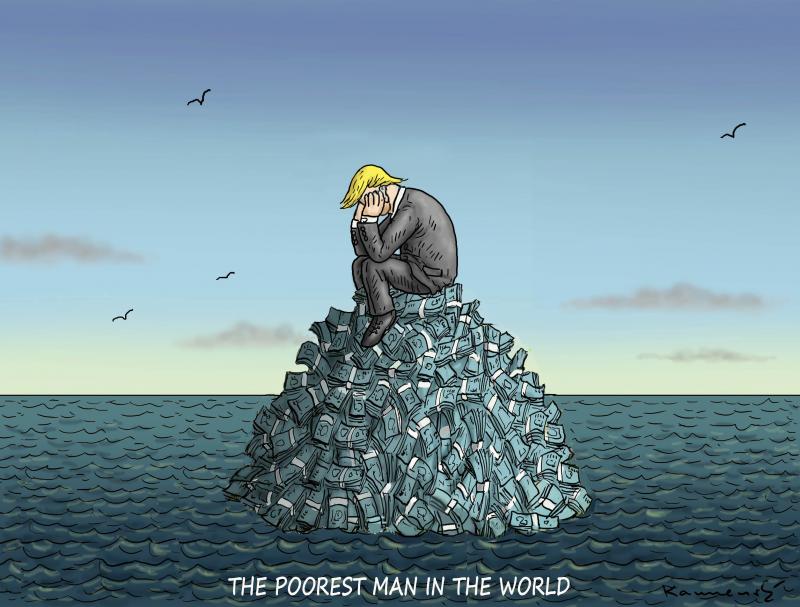Who is the poorest guy in the world? This question often sparks curiosity and empathy as we delve into the harsh realities of global poverty. While the concept of being the "poorest" is subjective, understanding the challenges faced by individuals living in extreme poverty is crucial. This article explores the stories of those who have been identified as some of the poorest people in the world, shedding light on their struggles and resilience.
Global poverty remains one of the most pressing issues of our time. Despite significant progress in reducing poverty rates over the past few decades, millions of people still live below the poverty line. The story of the poorest guy in the world is not just about numbers or statistics; it's about human experiences, struggles, and the fight for dignity.
Through this article, we aim to provide a comprehensive understanding of poverty, its causes, and potential solutions. By exploring real-life examples and stories, we hope to inspire action and foster a deeper appreciation for the challenges faced by those living in extreme poverty.
Read also:Zodiac Matches For Capricorn
Table of Contents
- Biography of the Poorest Guy in the World
- Defining Poverty: What Does It Mean to Be the Poorest?
- Global Statistics on Poverty
- Causes of Extreme Poverty
- The Impact of Poverty on Daily Life
- Resilience and Survival Strategies
- Solutions to Combat Poverty
- Case Studies: Stories of the Poorest People
- How You Can Support the Fight Against Poverty
- Conclusion: Taking Action Against Poverty
Biography of the Poorest Guy in the World
Who Is He?
While there isn't an official title for the "poorest guy in the world," certain individuals have been highlighted in media and reports due to their extreme living conditions. One such story is that of Simon Stevin, a man from Sub-Saharan Africa whose life exemplifies the struggles of extreme poverty. Below is a detailed biography of Simon Stevin:
| Full Name | Simon Stevin |
|---|---|
| Age | 45 years |
| Place of Birth | Mogadishu, Somalia |
| Occupation | Unemployed |
| Annual Income | Less than $100 |
| Family Status | Single, no children |
Defining Poverty: What Does It Mean to Be the Poorest?
Poverty is more than just a lack of income. According to the World Bank, extreme poverty is defined as living on less than $1.90 per day. However, the concept of being the "poorest" extends beyond financial metrics. It includes a lack of access to basic necessities such as clean water, healthcare, education, and shelter.
For individuals like Simon Stevin, being the poorest means facing daily challenges that most of us cannot fathom. From scavenging for food to sleeping on the streets, their lives are a constant struggle for survival.
Global Statistics on Poverty
Key Facts and Figures
The following statistics provide a glimpse into the global state of poverty:
- Approximately 689 million people live in extreme poverty worldwide.
- Sub-Saharan Africa accounts for nearly 40% of the global poor.
- Women and children are disproportionately affected by poverty.
- By 2030, it is estimated that over 400 million people could still be living in extreme poverty.
These numbers highlight the urgency of addressing poverty on a global scale. While progress has been made, much work remains to be done.
Causes of Extreme Poverty
The causes of extreme poverty are multifaceted and interconnected. Below are some of the primary factors contributing to this issue:
Read also:Journey To The Center Of
Economic Inequality
Income inequality is a major driver of poverty. In many countries, wealth is concentrated in the hands of a few, leaving the majority struggling to make ends meet.
Conflict and Instability
Regions affected by war and political instability often experience high levels of poverty. The destruction of infrastructure and displacement of populations exacerbate the problem.
Lack of Education
Access to quality education is crucial for breaking the cycle of poverty. However, millions of children around the world are denied this opportunity due to financial constraints or geographic barriers.
The Impact of Poverty on Daily Life
Living in extreme poverty affects every aspect of daily life. From nutrition to mental health, the consequences are far-reaching. Below are some of the most significant impacts:
Health Issues
Poor nutrition and lack of access to healthcare lead to a host of health problems. Children in poverty-stricken areas are particularly vulnerable to malnutrition and preventable diseases.
Education Disparities
Children from poor families often drop out of school to support their households, perpetuating the cycle of poverty. This lack of education limits future opportunities and perpetuates inequality.
Social Stigma
Living in poverty can lead to social isolation and stigma. Many individuals face discrimination and are excluded from community activities, further marginalizing them.
Resilience and Survival Strategies
Despite the challenges, many individuals living in poverty exhibit remarkable resilience. Below are some of the strategies they employ to survive:
- Community support systems
- Informal employment opportunities
- Innovative use of available resources
These strategies highlight the strength and ingenuity of people facing extreme adversity.
Solutions to Combat Poverty
Addressing poverty requires a multi-faceted approach. Governments, NGOs, and individuals all have a role to play in creating a more equitable world. Below are some potential solutions:
Economic Empowerment
Providing access to microloans and vocational training can help individuals start small businesses and improve their financial situation.
Education Initiatives
Investing in education is crucial for breaking the cycle of poverty. Programs that target underprivileged communities can make a significant difference.
Healthcare Access
Improving access to healthcare services, especially in rural areas, can help reduce the burden of disease and improve overall well-being.
Case Studies: Stories of the Poorest People
Real-life stories provide a powerful illustration of the realities of poverty. Below are two case studies that highlight the challenges faced by individuals living in extreme poverty:
Case Study 1: Simon Stevin
Simon's story is one of perseverance. Despite living in a war-torn region with limited resources, he continues to search for ways to improve his situation. His daily routine involves collecting scraps and selling them to earn a meager income.
Case Study 2: Maria Rodriguez
Maria, a single mother from Brazil, works multiple jobs to support her family. Her determination and resilience have inspired her community to rally around her, providing support and resources.
How You Can Support the Fight Against Poverty
Everyone can contribute to the fight against poverty. Below are some ways you can make a difference:
- Donate to reputable organizations working to alleviate poverty.
- Volunteer your time and skills to local charities.
- Raise awareness about the issue through social media and community events.
By taking action, we can collectively work towards a world where no one has to live in extreme poverty.
Conclusion: Taking Action Against Poverty
In conclusion, the story of the poorest guy in the world is a reminder of the challenges faced by millions of people worldwide. By understanding the causes and impacts of poverty, we can develop effective solutions to combat this global issue.
We urge you to take action by supporting organizations working to alleviate poverty and raising awareness in your community. Together, we can create a brighter future for everyone.
Feel free to share this article with your friends and family, and leave a comment below sharing your thoughts on how we can collectively fight poverty. Thank you for reading!


